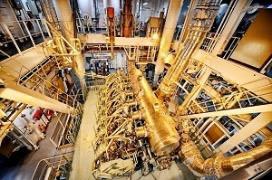10
INTERVIEW
INNOVATION IS KEY TO SUCCESS As the industry faces huge changes due to environmental considerations, Aleksander Askeland of Yara Marine Technologies explains how the company is facing up to the future
Aleksander Askeland Chief Sales Officer, Yara Marine Technologies
As the world’s first company to bring the in-line scrubber to the maritime industry, Yara Marine Technologies will still have scrubbers as a core product in the next few years. As the shipping industry faces increasingly stringent international and regional environmental regulations, Yara Marine Technologies is continuing to innovate. Here, chief strategy officer Aleksander Askeland discusses plans for the future. Q: What is the future of SOx scrubbers by Yara Marine? A: Scrubbers are great at cleaning sulphur oxide (SOX), and we scrub down to levels beyond compliance. We have more than 400 scrubbers installed so far, and we will continue to make all types of scrubbers for all types of vessels. Both our inline and packed bed scrubbers perform better than most alternative fuel oils, in both open and closed loop. Scrubbers are, beyond any doubt, the best solution for cleaning SOX, whether short, medium or long term. We see several issues with low sulphur fuel oil impurities, which damage engines. In addition, the CO2 footprint is larger with very low sulphur fuel oil well-to-wake. Q: What technologies do you think have the most potential to help achieve the International Maritime Organization’s (IMO) 2050 decarbonisation goal? A: New types of fuel and new ways to create propulsion are key. Our parent company, Yara International, is one of the world’s largest manufacturers of ammonia. Ammonia is a suitable zero carbon emission fuel, even for long deep-sea transport. Also, transforming fossil fuel engines to run on ammonia is possible. We are also
working with electric solutions. Shore power, or cold ironing as we call it, will at some point be mandatory. We now provide turnkey solutions for quick and automated shore power connections and installations. In addition, we are investing heavily in digital optimisation systems and data capture. We have just acquired Lean Marine and offer cutting edge AI-driven fuel optimisation, for instance by controlling RPM and propeller pitch to provide more trust per kWh. We usually gain more than 10% fuel savings with our new FuelOpt technology. Finally, yet importantly, we know that ships will again sail the seas – not with traditional sails, but metal wind wings. Wind-assisted propulsion can cut 30% of CO2 emissions, especially in the bulk and tanker segment. We have just entered a partnership with BAR Technologies – BAR tech WindWings by Yara Marine Technologies will set sail on the world’s first vessel retrofit with wind-assisted propulsion in 2022. An agreement to retrofit one of Cargill’s vessels is already in place. Q: What are your development strategy and top priorities now? A: We will continue to make and improve scrubbers, and increase our capacity on service. We are also expanding geographically, focusing on the Asian market with our well-established Shanghai office leading the way. However, we will continue to introduce new technologies to enable a greener maritime industry. In 2021 alone, we have launched cold ironing, moved intro batteries, started to put WindWings on ships and introduced cuttingedge fuel optimisation. You will see several more innovative technologies launched by Yara Marine Technologies, and put to sea, before the end of the year.
C L E A N S H I P P I N G INTERNATIONAL – Autumn 2021

















